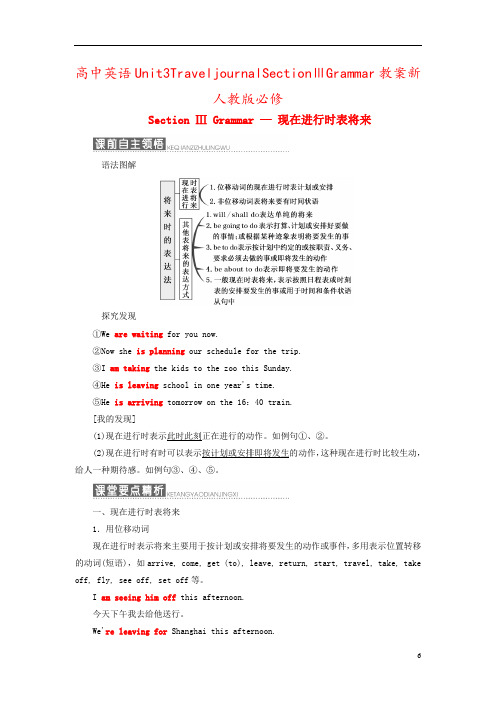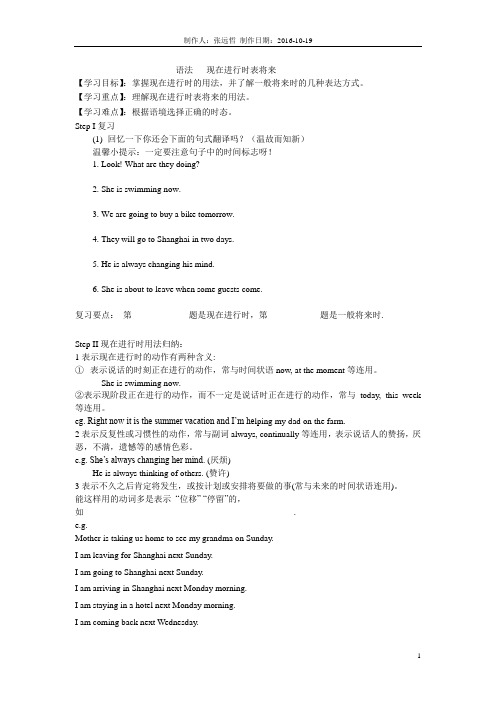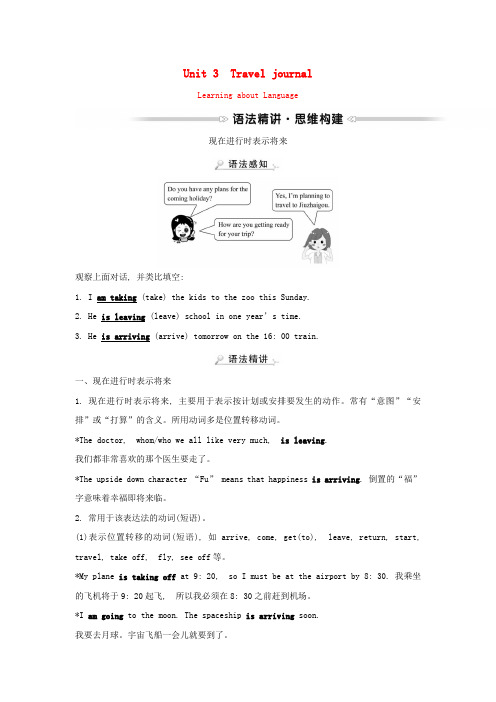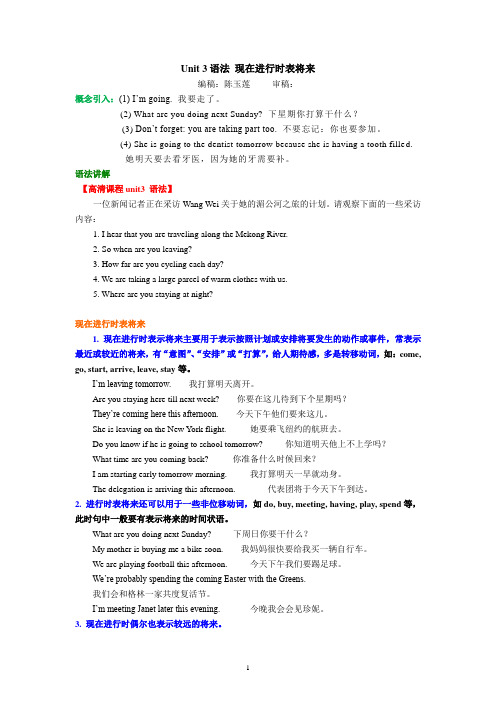高中英语Travel journal 巩固练习- 现在进行时表将来
高中英语Unit3TraveljournalSectionⅢGrammar教案新人教版必修

高中英语Unit3TraveljournalSectionⅢGrammar教案新人教版必修Section Ⅲ Grammar —现在进行时表将来语法图解探究发现①We are waiting for you now.②Now she is planning our schedule for the trip.③I am taking the kids to the zoo this Sunday.④He is leaving school in one year's time.⑤He is arriving tomorrow on the 16:40 train.[我的发现](1)现在进行时表示此时此刻正在进行的动作。
如例句①、②。
(2)现在进行时有时可以表示按计划或安排即将发生的动作,这种现在进行时比较生动,给人一种期待感。
如例句③、④、⑤。
一、现在进行时表将来1.用位移动词现在进行时表示将来主要用于按计划或安排将要发生的动作或事件,多用表示位置转移的动词(短语),如arrive, come, get (to), leave, return, start, travel, take, take off, fly, see off, set off等。
I am seeing him off this afternoon.今天下午我去给他送行。
We're leaving for Shanghai this afternoon.今天下午我们将动身去上海。
The plane is arriving in 10 minutes.飞机将在10分钟内到达。
[即时演练1] 补全句子①She is_leaving_for Singapore tonight.她今晚将动身去新加坡。
②When are_you_setting_off_for your holiday?你什么时候动身去度假?③His plane is_taking_off at 9:20, so he must be at the airport by 8:30.他乘坐的飞机将于9:20起飞,所以他必须在8:30之前赶到机场。
高一英语讲义:Unit 3 Travel journal现在进行时表将来

高一英语专题:Unit 3 Travel journal现在进行时表将来【必背重点词汇、短语】1. travel----泛指旅行journey----指长时间长距离的陆上旅行voyage----指长距离的水上旅行,也可以指乘飞机旅行trip----常指短时间短距离的旅行tour----指周游,巡回旅游2. prefer A to B 比起B,更喜欢Aprefer doing to doing 比起做…,宁愿做…prefer to do rather than do 与其做…,不如…3. flow through 流过,流经4. ever since 自从5. persuade sb. to do sth. 说服某人做某事6. be fond of 喜欢7. insist on doing 坚持做某事insist + that 从句(用should+ V原)8. care about 关心9. change one’s mind 改变想法10. altitude 高度attitude 态度,看法11. make up one’s mind to do下定决心做某事= decide to do = make a decision todo12. give in 让步,屈服give up 放弃13. be surprised to…对……感到惊奇to one’s surpris令某人惊讶的是……14. at last = finally = in the end 最终15. stop to do 停下来去做某事stop doing 停止做某事16. as usual 像往常一样17. so…that 如此…以至于…so + adj + a/an + n. + thatsuch + a/an +adj. + n. + that18. be familiar with 对……熟悉(人作主语)be familiar to 为……所熟悉(物作主语)【必背重点句型】1. My sister and I have dreamed about cycling along the Mekong River from where it begins to where it ends. 我姐姐和我一直梦想要沿湄公河从源头到终点骑车旅行。
Unit3-Travel-Journal-语法

语法现在进行时表将来【学习目标】:掌握现在进行时的用法,并了解一般将来时的几种表达方式。
【学习重点】:理解现在进行时表将来的用法。
【学习难点】:根据语境选择正确的时态。
Step I复习(1)回忆一下你还会下面的句式翻译吗?(温故而知新)温馨小提示:一定要注意句子中的时间标志呀!1. Look! What are they doing?_________________________________2. She is swimming now._____________________________________3. We are going to buy a bike tomorrow._____________________________________4. They will go to Shanghai in two days.________________________________5. He is always changing his mind.__________________________________6. She is about to leave when some guests come.____________________________________复习要点:第_____________题是现在进行时,第____________题是一般将来时.Step II现在进行时用法归纳:1表示现在进行时的动作有两种含义:①表示说话的时刻正在进行的动作,常与时间状语now, at the moment等连用。
She is swimming now.②表示现阶段正在进行的动作,而不一定是说话时正在进行的动作,常与today, this week 等连用。
e g. Right now it is the summer vacation and I’m he lping my dad on the farm.2表示反复性或习惯性的动作,常与副词always, continually等连用,表示说话人的赞扬,厌恶,不满,遗憾等的感情色彩。
高中英语Unit3TraveljournalLearningaboutLanguage学案新人教版必

Unit 3 Travel journalLearning about Language现在进行时表示将来观察上面对话, 并类比填空:1. I am taking (take) the kids to the zoo this Sunday.2. He is leaving(leave) school in one year’s time.3. He is arriving (arrive) tomorrow on the 16: 00 train.一、现在进行时表示将来1. 现在进行时表示将来, 主要用于表示按计划或安排要发生的动作。
常有“意图”“安排”或“打算”的含义。
所用动词多是位置转移动词。
*The doctor, whom/who we all like very much, is leaving.我们都非常喜欢的那个医生要走了。
*The upside down character “Fu” means that happiness is arriving. 倒置的“福”字意味着幸福即将来临。
2. 常用于该表达法的动词(短语)。
(1)表示位置转移的动词(短语), 如arrive, come, get(to), leave, return, start, travel, take off, fly, see off等。
*My plane is taking off at 9: 20, so I must be at the airport by 8: 30. 我乘坐的飞机将于9: 20起飞, 所以我必须在8: 30之前赶到机场。
*I am going to the moon. The spaceship is arriving soon.我要去月球。
宇宙飞船一会儿就要到了。
(2)一些表示非位置转移的趋向性的动词, 如do, buy, meet, have, play, publish, spend等, 此时句中一般要有表示将来的时间状语。
英语人教版必修一高中一年级《travel journal》现在进行时表将来

disadvantages
Takes longer than the train or airplane Does not provide meals Not convenient for visiting inland places expensive
We are flying to Shanghai next Friday. 4. 下课后我们打算在操场 踢足球。 After class we are playing football on the playground.
Thanks for you attention!
Eg : I am flying to Japan tomorrow.
明天我会飞往日本。
1. 我星期五动身去北京。
I’m leaving for Beijing this Friday. 2. 我的朋友今晚过来。 My friends are coming over this evening.
3. 下周五我们乘飞机去上 海。
1) come, go, stay, arrive, leave 等趋向动词的
现在进行时经常用于表示将来确切的计划。
Eg : I am leaving China
in two hours.
我将会在两个小时后
离开中国。
2)表示交通方式、行程安排的动词,例如 fly, walk, ride, drive, take (a bus, a taxi) 等的现在进行时也经常用于表示将来。
be going to表示客观安排或受人指示而做某 事。后+动词原形。
unit3Travel journal 语法(现在进行时表将来)

Unit 3语法现在进行时表将来编稿:陈玉莲审稿:概念引入:(1) I’m going. 我要走了。
(2) What are you doing next Sunday? 下星期你打算干什么?(3) Don’t forget: you are taking part too.不要忘记:你也要参加。
(4) She is going to the dentist tomorrow because she is having a tooth fille d.她明天要去看牙医,因为她的牙需要补。
语法讲解【高清课程unit3 语法】一位新闻记者正在采访Wang Wei关于她的湄公河之旅的计划。
请观察下面的一些采访内容:1. I hear that you are traveling along the Mekong River.2. So when are you leaving?3. How far are you cycling each day?4. We are taking a large parcel of warm clothes with us.5. Where are you staying at night?现在进行时表将来1. 现在进行时表示将来主要用于表示按照计划或安排将要发生的动作或事件,常表示最近或较近的将来,有“意图”、“安排”或“打算”,给人期待感,多是转移动词,如:come, go, start, arrive, leave, stay等。
I’m leaving tomorrow.我打算明天离开。
Are you staying here till next week? 你要在这儿待到下个星期吗?They’re coming here this afternoon.今天下午他们要来这儿。
She is leaving on the New York flight. 她要乘飞纽约的航班去。
高中英语Unit3TraveljournalSectionⅢGrammar__现在进行时讲义新人教版必修1

Section ⅢGrammar——现在进行时一、现在进行时的基本用法1.现在进行时表示说话时正在进行的尚未完成的动作或状态。
What are you doing now,Bob?鲍勃,你在干什么?Look!What are they watching?看,他们正在看什么?2.现在进行时表示目前这段时间正在进行的动作。
现在进行时可表示目前这段时间正在进行,但此时此刻未必正在进行的动作。
George is working on a new book about stories in schools.乔治在写一本关于校园故事的新书。
3.现在进行时与always,constantly,all the time等副词(短语)连用时,可表反复性、一贯性动作,常用来表示赞扬、生气、不满、厌恶等感情色彩。
He is always asking for money.他老是要钱。
She is constantly changing her mind.她总是改变主意。
[即时演练1] 完成句子①我们正在等你。
We are waiting(wait) for you.②格林先生在写另一部小说。
(说话时可能并未在写)Mr.Green is writing (write) another novel.③他总是先想着别人。
He is constantly thinking(think) of others first.二、现在进行时表示将来的用法1.动词come,go,arrive,leave,start,begin,return等的现在进行时可以表示将来的动作,常有“意图”“安排”或“打算”的含义。
这种用法比较生动,给人一种期待感。
它常表示最近或较近的将来会发生的动作。
They are coming here this afternoon.他们今天下午来这儿。
When are you leaving?你们什么时候动身?2.除上述动词外,还有一些动词也可用现在进行时表示将来。
高中英语 专题Unit 3 Travel journal 3 Grammar Writing试题(含解析)新人教版必修1

Unit 3 Travel journalGrammar:现在进行时表示将来现在进行时表示将来,主要用于表示按计划或安排要发生的动作,常有"意图""安排"或"打算"的含义。
这种现在进行时比较生动,给人一种期待感。
它常表示最近或较近的将来,所用动词多是表示瞬间或位移的动词。
常用的动词有:arrive,come,go off,leave,ride,drive,take off,fly,start,stay,walk,travel等。
☛Are you meeting Bill this evening? 你今晚将和比尔见面吗?1. come,go,stay,arrive,leave 等词的现在进行时经常用来表示将来确切的计划。
☛I’m leaving tomorrow. 我明天走。
2. 表示交通方式、行程安排的动词,如 fly,walk,ride,drive,take(a bus/a taxi)等的现在进行时也经常用于表示将来。
但偶尔也表示较远的将来。
☛When I grow up, I’m joining the army. 我长大了要参军。
3. 表将来的现在进行时有时含有"决心"的意思,多用在否定结构中。
☛I’m not waiting any longer. 我不再等了。
有时也用在肯定结构中。
☛I’m backing out. 我要打退堂鼓了。
4. 用这种现在进行时与对方讲话时可变成命令,不过语气比较温和。
☛Don’t forget: you are taking part too. 不要忘记:你也要参加。
5. 现在进行时也可在时间、条件或原因状语从句中表示将来。
☛When you are passing my way, please drop in.(用于时间状语从句)你什么时候路过我们家,请进来坐坐。
☛If they are not doing it, what am I to do?(用于条件状语从句)如果他们不干,那我该怎么办?6. 表示将来的现在进行时也可用在间接引语中,表示说话人相信它将是事实。
高中英语Unit3TraveljournalSectionⅣGrammer训练落实新人教版必修10813211.doc

Unit 3 Section ⅣGrammer—现在进行时表将来One night, Pilar was in a deep sleep when she was woken by her cat Inti. IntiPilar's bedroom and throwingopened her eyes, she saw that herwith Inti in her arms, shegot everyone out of the house before the earthquake hit. Thunder had saved her life.There are also stories of wild animals coming to the rescue of humans. One animal known to be a friend to humans is the dolphin. Oce, Todd Endris was surfing with his friends when he was attacked by a 13foot(4meter) shark. In the middle of the attack, a group of dolphins came to his rescue by forming a protective ring around Endris until he could get safely to shore(岸).Without the help of the dolphins, there is little chance that Todd could have escaped.No one is sure why animals have so often come to our rescue. However, it is clear that humans and animals enjoy a close relationship. It is important that we care for them as much as we can.【文章大意】本文是说明文。
新人教版必修1高中英语Unit3TraveljournalSectionⅢGrammar—现在进行时

一、现在进行时表将来的意义 现在进行时表示将来主要用于表示按计划或安排将要发生的 动作或事件。这种用法给人一种期待感,常表示最近或较近 的将来。
二、用于现在进行时表将来的动词 1.表示位置转移的动词,如 arrive, come, get(to), leave, return,
start, travel, take off, fly, see off 等。 We're starting for Shanghai this afternoon. 今天下午我们将动身去上海。 The plane is arriving in 10 minutes. 飞机将在 10 分钟内到达。
即时演练 1 完成句子 ①I am leaving tomorrow.
我明天离开。 ②When is he getting to/arriving at the station?
他什么时间到车站? ③What are you doing next Sunday?
下星期天你打算干什么? ④My mother is buying me a bike soon.
2.表示趋向性的动词,如 do, buy, meet, have, play, spend 等, 此时句中一般要有表示将来的时间状语。 I am publishing a book this year. 我打算今年出一本书。 The young man is meeting his friend this afternoon. 这个年轻人今天下午要去接他的朋友。
Section Ⅲ Grammar — 现在进行时表将来
语法图解
探究发现
1.We are waiting for you now. 2.Now she is planning our schedule for the trip. 3.I am taking the kids to the zoo this Sunday. 4.He is leaving school in one year's time. 5.He is arriving tomorrow on the 16:40 train. [我的发现] (1)现在进行时表示 此时此刻 正在进行的动作。如例句 1、2。 (2)现在进行时有时可以表示 按计划或安排即将发生 的动作, 这种现在进行时比较生动,给人一种期待感。如例句 3、4、5。
2018人教版高中英语必修1Unit 3 Travel journal Part 3优秀版

(come)!
8.Because the shop
(close) down,all the
T-shirts are sold at half price.
9.We
(go)to Rome next week.
10.Dr.Smith,together with his wife and daughters,
Part 3 Grammar
语法知识 通关 语法专项 训练
语法知识·通关
现在进行时表将来 1.现在进行时通常用于表示某动作在说话时正在进行,但有时也可以表示
将来。现在进行时表将来的情况有: (1)表示不久之后或马上就要发生的动作。能这样用的通常是表示“位
移”“停留”等意义的动词,如:come,go,stay,arrive,leave,start, fly,return等。 We’re starting for London this afternoon. 今天下午我们将动身去伦敦。 The plane is arriving in 10 minutes. 飞机将在10分钟后到达。
(2)现在进行时表示将来除使用位移动词外,也可使用某些非位移动词(词 组),如do,buy,meet,have,play,publish,run out,take等,此时句中一 般有表示将来的时间状语或上下文有将来情况的提示。 The young man is meeting his girlfriend this afternoon. 这个年轻人今天下午要去接他的女朋友。 I am publishing a book this year. 我打算今年出一本书。
(3)be to do表示按照计划将要做的事。 She is to meet him at an agreed place in the street. 她要与他在街上事先约好的地点见面。
高中英语Unit3TravelJournal语法巩固训练新人教版必修2

Unit3 Travel journal语法巩固(The Present Continuous Tense; expressing futurity)一.单项选择1I have two tickets to Beijing. I_______ my father.A am takingB have takenC takeD will have taken2 Selecting a mobile phone for personal use is no easy task because technology_______ so rapidly.A has changedB is changingC will have changedD will changed3 He ________ of how he can do more for the people.A will always thinkB is always thinkingC has always been thinkingD does think always4 I want to know when he ________ for New York.A has leftB had leftC is leavingD would leave5 __ That famous fish _______ because of pollution.__ Yes, we have to do something to save it.A has diedB had diedC is deadD is dying6 All day today, Jane and her sister _______ very hard at home.A are workB are workedC are workingD have working7 When I see Jean in the street, she always _______at me.A smiledB has smiledC was smilingD smiles8 Janet_______ one dress already, and now she _______ another.A made, is been makingB had made, is makingC has made, is makingD would have made, is being made9 Do you know when Mr. Brown___________? When he ________, please let me know.A is coming, will comeB comes, is comingC will come , comesD comes, will come10 While________, she cut himself.A shavedB shavingC was shavingD was shaved11 As she_________ the newspaper, Granny________ asleep.A read, was fallingB was reading, fellC was reading, was fallingD read, fell12 I don’t think Jim saw me, he ________ into space.A just staredB has just staredC was just staringD had just stared13 __Come on, Peter. I want to show you something .__ Oh, how nice of you. I ________ you _________ bring me a gift.A never think, are goingB never thought, were goingC didn’t think, were goingD hadn’t thought, were going14 I don’t really work here, I ________ until the new secretary arrives.A just help outB have just helped outC am just helping outD will just help out15 According to the timetable, the plane for London_______ at seven.A leavesB has leftC leftD will leave二用括号中所给词的正确时态填空。
高中英语1Unit3 Travel journal 同步练习 语法(进行时将来)

号顿市安谧阳光实验学校Unit 3 Travel journal 同步练习——语法(进行时—将来)单项选择1.My aunt ________ to see me; she’ll be here soon.A. comesB. is comingC. has comeD. shall come2. Han Meimei is doing her homework while her sister _______a picture.A. drawsB. has drawnC. has been drawnD. is drawing3. -Tom has just arrived.-Yes, but I didn't know he _______until yesterday.A. will comeB. is comingC. was comingD. was about to come4. Mr. Black____ Shanghai in a few days. Do you know when the earliest plane___ on Sunday?A. is leaving; takes offB. leaves; takes offC. is leaving; is taking offD. leaves; is taking5. How can I sleep when you _____ so much noise?A. madeB. have madeC. are makingD. were making6 Janet _____ one dress already, and now she_____ another.A. made, is been makingB. had made; is makingC. has made; is makingD. would have made; is being made7. That baby _________ nonstop for the past hour.A. criedB. was cryingC. is cryingD. has been crying 8. —I’m going to the States. —How long ______ you ______ in the States?A. are; stayedB. are; stayingC. have; stayedD. did; stay9. When I see Jean in the street, she always _______ at me.A. smiledB. has smiledC. was smilingD. smiles10. He ________ for the money since last Monday.A. was waitingB. has been waitingC. waitedD. waits11. I have won a holiday for two to Florida. I _____ my mum.A. am takingB. have takenC. takeD. will have taken12. —You’ve left the light on. —Oh, so I have. ____ and turn it off.A. I’ll goB. I’ve goneC. I goD. I’m going13.-Don’t forget to post this letter for me. -________A.I don’tB. I won’tC. I can’tD.I haven’t14. —Alice, why didn’t you come yesterday? —I ______, but I had anunexpected visitor.A. hadB. wouldC. was going toD. did15. To find the street where I lived in my childhood is no easy taskbecause the city _____so rapidly all these years.A. is changingB. has changedC. will have changedD.will change16. He________ quite well, but he hasn’t had time to swim since this summer.A. will swimB. have swumC. swamD. swims17. I'm terribly sorry for being late, but I ______ the wrong bus.A. catchB. had caughtC. caughtD. was catching18. The stone on the river bank rolled under her feet; she was _____into the river,and she called out for help.A. being jumpedB. jumpedC. pulledD. being pulled19. The workers_____ busily when the boss came to look for something she_____in the office.A.had worked,had left B. were working, had leftC.working,had left D.had worked, left20. —__________for Shanghai? —Yes.And I’ll come back in two weeks.A.Have you left B.Are you leaving C.Do you leave D.Did you 1eave21. —You are drinking too much. —Only at home.No one else________me but you.A. had seenB. seesC. sawD. is seeing22. I am told Mr. Wang ________ a book on environment protection lastyear, but I don’t know whether he has it now.A. was writing B. wrote C. writes D. had written23. Please call again. Jim ______ a bath just now.A. has hadB. was havingC. is havingD. has24. I didn’t like Aunt Lucy, who ____ without warning.A. always turned upB. has always turned upC. had always turned upD. was always turning up25. A new cinema _____ here. They hope to finish it next month.A. will be builtB. is builtC. has been builtD. isbeing built26. —Don’t sit on the stone —Oh, it _____ a bit cold.A. is feelingB. feltC. feelsD. is felt27. We can’t move into the house, because it ______.A. has been repairedB. is repairingC. is repairedD. is being repaired28. —When are you leaving?—My plane _____ at six.A. took offB. is about to take offC. takes offD. will take off29. —When ____ you return the dictionary to me?—Only when I ____ you next Sunday.A. will;seeB. do;will seeC. will;will seeD. do;see30. —Has Tommy finished his homework yet?—I have no idea; he ____ it this morning.A. was doingB. had been doingC. has doneD. did参考答案单项选择1. B is coming表示将来。
高中英语人教版一Unit3TraveljournalGrammar:现在进行时表将来

高中英语人教版必修一Unit3TraveljournalGrammar:现在进行时表将来学校:___________姓名:___________班级:___________考号:___________一、用单词的适当形式完成句子完成句子。
在空白处填入适当的内容或括号内单词的正确形式。
1.I’ve got two tickets for a wonderful film. I ________ (go) with my sister.2.No decision ________ (make) about any future plan until everything is ready.3.The president ________ (leave) for that country to attend a very important conference, and he is on the way to the airport now.4.As the Festival ________ (come), people are busy preparing for it.5.Call the airport and find out when the plane ________ (leave).6.—What about going to see the next zoo here tomorrow?—Why not? And I ________ (take) my new friend with me.7.Because the shop ________ (close) down, all the T-shirts are sold at half price. 8.—Are you still busy?—Yes, I ________ (finish) my work, and it won’t take long.9.Ladies and gentlemen, please fasten(系上) your seat belt. The plane______(take off). 10.When you________(pass) my home, please let me know.二、阅读选择阅读理解阅读下列短文,从每题所给的四个选项(A、B、C和D)中,选出最佳选项。
- 1、下载文档前请自行甄别文档内容的完整性,平台不提供额外的编辑、内容补充、找答案等附加服务。
- 2、"仅部分预览"的文档,不可在线预览部分如存在完整性等问题,可反馈申请退款(可完整预览的文档不适用该条件!)。
- 3、如文档侵犯您的权益,请联系客服反馈,我们会尽快为您处理(人工客服工作时间:9:00-18:30)。
巩固练习【unit3 语法】一、完成下列对话1. Harry: _____ Sarah _____ (come) on the trip tomorrow?Cindy: Yes. She _____ (leave) tomorrow morning.Harry: Do you know what time?Cindy: She _____ (leave) the house at seven o’ clock and will catch the train at eight.2. Matthew: How _____ you _____ (get) to school?Joe: I _____ (cycle) to school and leaving my clothes behind. My mum _____ (bring) my clothes to school tomorrow morning.Matthew: Lucky you! That seems a good idea.3. Peter: Where _____ we _____ (go)?James: To the sea.Peter: How _____ we _____ (get) there?James: By car.--------二、用所给动词的适当时态填空1. —Is everybody here?—No. The speaker _________ (come) soon.2. The weather _________ (get) warmer and warmer.3. I _________ (write) a new book these days.4. The girl ____ always ________ (leave) things about.5. —I’m going to the US to study law.—How long _______ you _______ (stay)there?6. What will you want to be when you ______ (grow) up?7. Look at the lightning. It _________ (rain).8. Our English teacher _________ (leave) Shanghai in a few days.9. —Jim is in town for a few days.—Really? Great! I _________ (give) him a call. Is he staying at his Aunt Rosa’s?三、完成句子1. 下星期天你要干什么? (do)What ________________ next Sunday?2. 去北京的火车就要进站了。
(arrive)The train to Beijing ________ soon.3. 他在写一本有关乡村音乐的书。
(write)He ____________ on country music.4. 我正要询问有关事故的情况。
(ask)I _____________ the accident.5. 我的朋友总是先为别人着想。
(think)My friend ___________ others first.6. 下一列火车明天早上8点离开。
(leave)The next train ________ 8 o’clock tomorrow morning.7. 看这幅图,那些孩子正在公园里放风筝。
(fly)Look at the picture. The children ___________ in the park.8. 小汤姆一直在哭,他妈妈很生气。
(cry)Little Tom _________ all the time, which makes his mother angry.9. 穿上大衣!我带你下楼看医生去。
(take)Put on your coat! I __________ you to see the doctor downstairs.10. 不要吵闹,爸爸正在听新闻。
(listen)Don’t make noises. Father ________ to the news.四、单项选择:1. The train to Shanghai starts at 3 p. m., Dr. Smith, together with his wife and daughters, ______ visit Beijing this summer.A. is going toB. are going toC. was going toD. were going to2. —Have you got any job offers?—No. I _____.A. waitedB. had been waitingC. have waitedD. am waiting3. Teenagers _____ their health because they play computer games too much.A. have damagedB. are damagingC. damagedD. will damage4. My money _____. I must go to the bank to draw some of my savings out before I’ve none in hand.A. has run outB. is running outC. was running outD. runs out5. Frank, with his two sisters, _____ London by train which _____ at 8: 30 next morning.A. is leaving for; will leaveB. are leaving for; leavesC. is leaving for; leavesD. will leave for; will leave6. —Why did you buy so much food, mum?—Your grandparents ______ to spend this weekend with us.A. are comingB. comeC. were comingD. came7. —I hear you’ve won a holiday to New York.—Yes. And I _____ my daughter.A. am takingB. takeC. tookD. have taken8. My dictionary ___, I have looked for it everywhere but still___ it.A. has lost, don't findB. is missing, don't findC. has lost, haven't foundD. is missing, haven't found.9. As a UN report warns, animals ________ at a speed 100 times faster now than any time in the past since the dinosaurs were wiped out.A. are dying outB. have died outC. were dying outD. had died out10. —I’m not finished with my dinner yet.—But our friends ______________ for us.A. will waitB. waitC. have waitedD. are waiting11. —Why don’t we choose that road to save time?—The bridge to it ______ .A. has repairedB. is repairedC. is being repairedD. will be repaired12. —I don’t think the headmaster knows who did it.—Well, surprisingly she does. A boy _____ in her office now.A. has been questionedB. is being questionedC. is questioningD. has questioned13. I don’t understand why you _____ your mind constantly! We haven’t been able to decide where to spend our holiday, you know?A. changeB. will changeC. are changingD. have changed14. —Are you still busy?—Yes, I _____ my work and it won’t take long.A. just finishB. am just finishingC. have just finishedD. just finished15. —Is this handbag yours?—No, mine ______ there on the wall.A. hangsB. has hungC. is hangingD. hung16. John moved to Laos five years ago and _____ there ever since.A.was B.has been C.is staying D.was staying17. — Do you live in this city?— No, we ______ it for holidays.A. just visitedB. are just visitingC. had already visitedD. just visit18. Hurry! The train ________. You know it ________ at 8:30 a.m.A. leaves; leavesB. is leaving; leavesC. leaves; is leavingD. is leaving; is leaving19. —You’re left the light on.— Oh, so I have. ______ and turn it off.A. I’ll goB. I’ve goneC. I goD. I’m g oing20. Mr. Smith _____ to have a talk with you. He will be here in a minute.A. comeB. comingC. has comeD. is coming五、改正下列各个句子中的时态错误。
